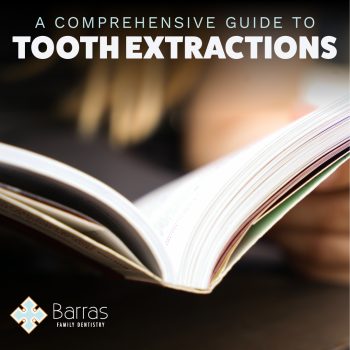A Comprehensive Guide to Tooth Extractions
 Tooth extractions may sound intimidating, but they are sometimes necessary to protect your overall oral health. Whether due to severe decay, infection, or overcrowding, removing a tooth can relieve pain and prevent further dental complications. At Barras Family Dentistry, we make the extraction process as comfortable and positive as possible. Here’s everything you need to know about when an extraction is needed, what to expect, and how to recover smoothly.
Tooth extractions may sound intimidating, but they are sometimes necessary to protect your overall oral health. Whether due to severe decay, infection, or overcrowding, removing a tooth can relieve pain and prevent further dental complications. At Barras Family Dentistry, we make the extraction process as comfortable and positive as possible. Here’s everything you need to know about when an extraction is needed, what to expect, and how to recover smoothly.
When Is a Tooth Extraction Necessary?
A tooth extraction is often the best solution when a tooth is beyond repair. Common reasons for extractions include:
- Severe Decay or Damage: If a tooth is too decayed or fractured to be saved with a filling or crown, removal may be necessary.
- Gum Disease: Advanced periodontal disease can cause teeth to loosen, requiring extraction.
- Infections or Abscesses: When an infection reaches deep into the tooth and cannot be treated with a root canal, extraction is the safest option.
- Overcrowding: Some patients need teeth removed to create space for orthodontic treatment.
- Impacted Wisdom Teeth: If wisdom teeth are causing pain, infections, or alignment issues, extraction is often recommended.
If you’re experiencing persistent pain or dental issues, a consultation with Barras Family Dentistry can determine whether an extraction is the best course of action.
What Happens During a Tooth Extraction?
The extraction process varies based on the complexity of the case. Here’s a step-by-step breakdown of what to expect:
- Examination & X-Rays: Dr. Barras will assess the tooth and surrounding area to determine the best extraction method.
- Anesthesia & Sedation: To ensure comfort, local anesthesia is used to numb the area. For more complex cases or anxious patients, sedation options may be available.
- Extraction Procedure:
- Simple Extraction: If the tooth is visible, it is gently loosened and removed with forceps.
- Surgical Extraction: If the tooth is impacted or broken below the gumline, a small incision may be made to remove it.
- Stitches & Aftercare: In some cases, dissolvable stitches may be placed, and gauze is used to control bleeding.
The entire procedure is quick, and due to anesthesia, you often experience little to no discomfort.
What to Expect After a Tooth Extraction
Proper aftercare is crucial for a smooth and comfortable recovery. Here’s what to keep in mind:
- Bleeding: Some minor bleeding is normal for the first few hours. Bite down on gauze to help clot formation.
- Pain Management: Over-the-counter pain relievers like ibuprofen help reduce discomfort. Your dentist may prescribe medication if needed.
- Swelling: Apply an ice pack to the cheek for 10-15 minutes at a time to reduce swelling.
- Diet Adjustments: Stick to soft foods like yogurt, mashed potatoes, and soup for the first 24–48 hours. Avoid hot, crunchy, or spicy foods that can irritate the area.
- Avoid Straws & Smoking: Using a straw or smoking can dislodge the clot and lead to dry socket, a painful condition that slows healing.
- Oral Hygiene: Keep the area clean by rinsing gently with warm salt water after the first 24 hours, but avoid brushing directly over the extraction site.
Most patients recover within a few days, but complete healing can take one to two weeks.
How to Avoid Tooth Extractions in the Future
While extractions are sometimes unavoidable, proper dental care can help prevent them. Here’s how:
- Brush and floss daily to prevent decay and gum disease.
- Visit Dr. Barras at Barras Family Dentistry regularly for cleanings and checkups to catch issues early.
- Protect your teeth by wearing a mouthguard during sports or avoiding hard foods that can cause fractures.
- Address dental problems promptly—early treatment of cavities and infections can prevent the need for extractions.
Need a Tooth Extraction? Contact Barras Family Dentistry Today!
If you’re experiencing severe tooth pain, infection, or overcrowding, Barras Family Dentistry is here to help. We provide gentle, expert extractions with a focus on comfort and quick recovery.
📞 Call (337) 235-3395 today to schedule your consultation or book an appointment online.
Disclaimer: The content of this blog is not intended to be a substitute for professional medical advice, diagnosis, or treatment. Always seek the advice of qualified health providers with questions you may have regarding medical conditions.










